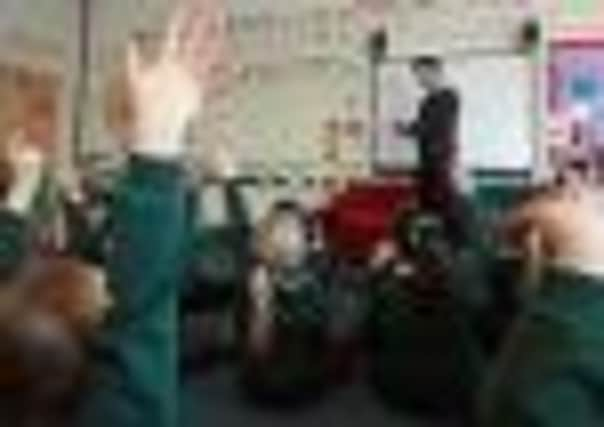George McMillan: Education shake-up won’t fix faltering system


Here we go again! Yet another big shake-up of Scottish education aimed at improving standards and preparing our young people for life and work. This time it bears the pretentious title “Curriculum for Excellence”.
All very commendable, but why do our leaders think it necessary to keep making such massive changes in our schools, rendering the system ever-more complicated and ineffective?
Advertisement
Hide AdAdvertisement
Hide AdOur educational reformers obviously paid no heed to the maxim: “If it ain’t broke, don’t try to fix it”, when they began their destructive reforms half-a-century and more ago.
Keir Bloomer, one of the architects of the new changes, has said in typical non-English modern jargon that “a shake-up was needed to future-proof young minds”. “Future-proof?” I ask you.
Mrs Liz Fordyce, Dundee’s education convener, said that the Curriculum for Excellence offers “a broad general education until the end of S3. This is important as it allows pupils to have the skillset necessary for success in the senior examinations.” “Skillset”? Jings!
The statements of the architects and supporters of the new changes are chock-full of such jargon and vague, almost meaningless phrases. They give a clue to the woolly thinking behind them and behind much of what has gone on in Scottish education since our reformers began their dismantling of our world-beating system in the 1940s.
Mr Bloomer extends a criticism of the way some pupils were badly taught in the past by poor teachers to a condemnation of the whole system of fact and rote learning. He says: “Simply swotting facts so that you can pass an exam isn’t enough any more. Individuals need to learn to problem-solve and be innovative if they are to compete in the modern world. Everyone must be given the tools to go as far as they can go.”
Mr Bloomer blames the traditional school system for past failures, labelling it “very inflexible and slow to change, with rigid timetables, primitive use of information and communications technology and progression by age cohort – regardless of how the individual is doing”. “Age cohort?” That jargon again.
He says that, previously, teenagers left the education system with a particular set of skills they could use until they retired – the traditional lecture-based teaching system suited that. However, those going through school at the moment will probably end up in jobs that don’t even exist yet. “The mission for education,” he says, “can no longer be to set you up for life; it has to be to turn you into a lifelong learner.”
So what’s new? Under Scotland’s once excellent education system – a real curriculum for excellence – the aim was to prepare young people for life and to make them lifelong learners.
Advertisement
Hide AdAdvertisement
Hide AdFor that, they were given the basic skills for any kind of job or any continuation of their education at college or university. Because they could read, write and count efficiently, they could turn their hands to any job and quickly acquire new knowledge and skills. At junior secondary school, they built on and expanded what they had learned at primary school to prepare them for work and interest them in lifelong learning.
At senior secondary school and university, the aim was originally to give them a general education until they gained a first degree, then specialise thereafter in medicine, law, theology, the arts and the sciences. If James Watt, Sir Alexander Fleming, Sir James Simpson, Thomas Telford, Lord Kelvin, John Logie Baird and a whole host of Scottish engineers, scientists, doctors and inventors were not innovative, who is? And they were all educated under the supposedly uninspiring old Scottish schools system.
My own parents and grandparents received only a primary school education in Dundee and Aberdeen, but were able to use their highly developed skills in the English language and in arithmetic to succeed in a wide variety of occupations and to take part in a whole range of cultural activities throughout their lives.
And they were not an exception to the rule. Pupils going through the old Scottish schools system knew exactly where they stood in relation to their fellows in the education stakes by virtue of three school reports a year.
When they left school, they were awarded a leaving certificate listing their achievements, and employers and universities knew that these qualifications were soundly based and stringently tested.
It was not my experience, nor that of any of my family or acquaintances, that the old Scottish schools system was rigid and consisted of learning facts without encouraging pupils to think for themselves, or be creative.
Our teachers did, however, ensure that we had the necessary foundation and basic skills on which to build.
Mr Bloomer adds: “Everyone must be given the tools to go as far as they can go.” Precisely! But at the moment, pupils are not being given the tools nearly as efficiently as they once were. I fear that, under the new Curriculum for Excellence, there is little hope of improvement. It is no coincidence that Scotland is falling behind other nations such as Germany in the educational standards of our young people.
Advertisement
Hide AdAdvertisement
Hide AdIf it ain’t broke, don’t try to fix it. Unfortunately, our Scottish education system is broke, but the new Curriculum for Excellence shows no signs of being able to fix it.
• George K McMillan MA MEd is a former assistant Rector at Perth Academy.